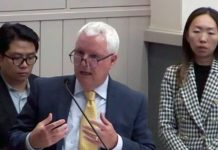Ten minutes before 1 am on a weeknight, at the end of its third-longest public meeting in over four years and with barely a handful of citizens watching, the South Pasadena City Council early on June 16 took up the last of a 28-item agenda–the 15-page report of the Finance Ad Hoc Committee (FAHC).
Twenty-one months earlier, the council unanimously voted to establish and charged the FAHC with cleaning up and advising on the aftermath of the financial management meltdown that led to the departures of the city manager, finance director, a near-complete turnover of finance department staff, raised questions about the city attorney and treasurer, and played a role in the first resignation of a council member in 61 years.
Council members took 20 minutes to dispense with the FAHC report. They first took turns criticizing its tone, format, context, and quality. Then, without discussing its recommendations, they adjourned.
The council’s approach seemed to echo FAHC member Peter Giulioni’s sentiment that the time had come “to put this piece of South Pasadena history behind us.”
But the council action was so stark that later, Council Member Evelyn Zneimer apologetically promised to have the item brought back, probably in August.
And, this month, it was disclosed that the FAHC approved the report despite knowing that it included inaccurate information.
FAHC recommendations included creation of a new internal auditor independent of the city manager; commencement of search to replace Colantuono, Highsmith & Whatley, PC (CHW), the city’s contract law firm, against which the report alleges conflicts of interest; documenting the extent of the city’s legal liabilities; and codifying the city’s financial reporting protocols. It said if these measures were not taken within a year, the council should commission a forensic audit to look more closely into its many findings.
The council’s take on the FAHC report came two days after a meeting of the city’s standing Finance Commission, during which it was politely but aggressively critiqued by Finance Chair Ed Elsner, a former FAHC panelist who resigned in protest. For over a half hour, Elsner launched a fusillade of complaints, saying the report failed to clearly define terms, mention, or give adequate review to previous reports concerning the city’s finance management, or sufficiently examine the role of a retaliation lawsuit filed by terminated senior account clerk Lauren Rubin. He also complained of its status as a non-Brown Act board, meaning it was not subject to the public notice, record keeping or reporting standards of a more formal city council-chartered commission.
But he said the report raised reasonable questions about the adequacy of the city’s litigation risk management practices—something he said the Finance Commission will focus on this year–and CHW’s billings and fees for its work on Alison Smith’s lawsuit against the city.
Mayor Pro Tem Jon Primuth and Council Member Jack Donovan both served as council representatives on the FAHC but distanced themselves from its output during the council meeting.
The report “brings forward some very important points and narrates some very important history” Primuth told his council colleagues, but is “flawed,” “lacks context” and “fails in the due process area.” He said “no effort was made” to have the former or current city attorney, city manager, or finance director comment before the draft was finalized.
Primuth averred he and Donovan “did not have any input on the recommendations,” and complained they were “not invited” to one FAHC meeting. He described his role in the ad hoc’s report as “a secretary trying to faithfully execute a reasonable consensus” and that he was only a “contributing author in terms of restyling some of the points.”
But during a recorded session of the FAHC’s second-to-last meeting March 9, Primuth actively discussed the recommendations with FAHC members and offered suggestions to punch up the findings. He said the recommendations needed to be rewritten “for pros, cons and confidence-building measures that will actually be effective,” though he deferred the actual rewrite to another member.
During his 2020 city council campaign, Primuth said “restoring community trust in the city’s financial operations and fiscal integrity” would be “among the highest priorities” for the new council and promised the city would “produce a visual progress report and timeline” on various matters, including “any items from the ad hoc committee.”
But at the meeting, Primuth did not act to discuss the recommendations. He said only that he wanted to “make sure all council members have read the report and list of recommendations and been given the opportunity to take up any of the recommendations.” After a long silence, Mayor Michael Cacciotti–the only council member who did not offer an opinion on the FAHC report–adjourned the meeting.
Donovan, who also served on the FAHC but did not attend its March 9 meeting, associated himself with Primuth’s comments.
Council Member Evelyn Zneimer was surprised because the FAHC report didn’t have the earmarks of a “congressional ad hoc report,” offering no list of members, record of how each voted on the final draft, nor describe its scope. “To me, it is hearsay.”
Council Member Diana Mahmud complained the report contains “numerous gratuitous comments” and “perhaps unintentionally but necessarily, questions the integrity of our auditor,” for which she saw no basis. She agreed with Zneimer about the report’s failure to list members, record their votes or disclose authorship. “That is opaque and totally nontransparent. All of this, in combination with the tone, denigrates from the report.”
Push Back
The final version of the report was largely drafted by former Council Member Steve Rossi, who helped uncover some of the information that led to disclosure of the city’s financial mismanagement—including two previously secret reports–and whose hostility toward certain mostly former city leaders is public record. It was Rossi who originated the idea for the FAHC, for which Elsner expressed appreciation during his presentation to the Finance Commission.
After the council meeting, Rossi disputed Zneimer and Mahmud’s complaints about the report’s presentation. He supplied to the South Pasadenan News a copy of the June 5 email he sent to City Manager Arminé Chaparyan delivering the report, in which he listed the names of the seven members (including Primuth and Donovan) who “reviewed and approved” it.
Primuth and two other members of FAHC, Peter Giulioni and Council Member Donovan, have confirmed that all seven panelists who attended the final FAHC meeting approved the report.
A city official told the South Pasadenan News the information in Rossi’s email “did not provide background and was not substantive.” Nor did the two-page transmittal memo prepared by Chaparyan and Interim Finance Director Ken Louie mention the remaining FAHC members’ approval of the report.
Notably, Rossi’s email to the city manager did not name or report the views of one panelist, Edward Corey, who did not attend the FAHC’s final meeting and had sent an email to its members declining to endorse it, nor report or explain why two of FAHC’s members—Elsner and Charles Li–had resigned from the panel.
In their transmittal memo, Chaparyan and Louie followed the Finance Commission’s recommendation that the FAHC report be “received and filed” with no suggestion on how to approach its recommendations. “It is under the city council’s purview to direct staff on any further action in response to the findings or recommendations of the report,” they wrote.
In line with a growing trend for council agenda items, the agenda packet did not include a section reporting on whether the report was submitted for legal review by the city attorney. Nonetheless, Chaparyan told the South Pasadenan that “our agenda processing does include city attorney review.”
Jon Primuth Post-Meeting Remarks; Discloses Report Includes Inaccuracies
In a later interview, Primuth noted that he and Donovan were added to the FAHC several months after its initial creation because the two original council liaisons had lost their reelection bids. He said the FAHC was well along in its work when they joined, and “we were very much not of equal standing” with the citizen members.
He said many of the identified finance reporting problems were addressed in the various workshops on, and incorporated into, the budget that was also approved that evening. He said he did not start a conversation on the recommendations because of the late hour and asserted he’d fully anticipated they would be brought up at a later meeting.
“Rather than initiate discussion on my own, I wanted to see if any of the other council members expressed interest or support. They each indicated they had read the report. They had nothing they wanted to follow up on for discussion. From that, I understood them to be saying they didn’t want to discuss any of the recommendations.”
Primuth said he still intends to keep his campaign pledge to offer a “visual progress report” on the finance issues. This will occur Aug. 18, when the council is slated to give final approval to its newly developed set of financial reporting policies and procedures.
Primuth also offered details about how the FAHC report emerged. By the time of the FAHC’s second-to-last meeting in March, Elsner, who’d co-written the first draft with Rossi, had resigned and Primuth read Rossi’s latest version closely for the first time. The scope had been expanded to include issues “that, while politically salient from a certain point of view, were not actually investigated, documented or discussed in any depth by the committee.” The report had become “a vehicle for many issues and topics not part of the original circumstances” over which the committee was created, including a set of “red flags” –nominally to be used as indicators on whether to recommend a forensic audit. The red flag analysis “became the entry point for essentially political arguments masquerad[ing] as findings of the committee, targeting the prior city manager, the city treasurer, and the former and current city council.”
Primuth opted to play a “facilitative” role as a means to get a report out sooner than later or not at all, “flawed though it may have been…I thought the errors in the report were outweighed by the importance of bringing a critical report to the city.”
His dilemma, Primuth said, was “how does the council deal with a report on one of the most important dark chapters in city reporting history that has sharp points to make that are important to the community and also had problematic content and was not developed as a consistent document?”
After the March FAHC meeting, Rossi sent Primuth a new finding he wanted to include in relation to the city’s recent settlement in the Alison Smith sewer case–even though it had not been discussed by the panel and was not within the scope of the ad hoc’s charge. “It was clear to me [Rossi] had political points to make on recent events of which he was not fully knowledgeable,” said Primuth. He informed the other FAHC members “about the inaccuracies of the proposed finding and the existence of other facts and considerations.” The group reached a compromise “and revised the finding to avoid some of its inaccuracies,” he said, “and the draft was approved for release.”
Rossi maintains the report has no inaccuracies.
Staff Reports Improvements
At the council meeting, Chaparyan and Louie said many of the FAHC’s findings “have been remedied.” Earlier in the meeting, the city approved its 2022-23 budget and Annual Comprehensive Financial Review (ACFR) with its clean audit. Louie said the department completed its “mid-year” report, was “on the brink” of approving the newly written financial policies and procedures and has reduced the number of findings reported by the auditor in recent years.
Council members took up this theme. “The original purpose of the ad hoc committee was to find out what was going wrong with reporting of the finances of the city,” said Council Member Donovan. But now, “a lot of the recommendations have been absorbed by the finance department and so it’s served its purpose.”
“So really, we are on the mend,” agreed Zneimer.
“We know that the city is making great progress on resolving what have been long-standing problems in the finance department,” Mahmud added.
Mayor Cacciotti and staff also pointed to the awarding of what the city called the “prestigious” Certificate of Achievement for Excellence in Financial Reporting” (CAEFR) for its 2018-19 fiscal year ACFR from the National Government Finance Officers Association, and the city’s expectation it will receive the CAEFR for its 2019-20 ACFR.
Only government bodies with “clean” audits can apply for the CAEFR, which recognizes ACFRs that are “easily readable, efficiently organized” and whose content meets generally accepted accounting practices and specified program standards.
However, it is worth noting the CAEFR denotes only compliance, not exceptional achievement. “It is not an award where applicants compete against other applicants,” said a GFOA spokesperson. The award normally goes to over 98 percent of the 4,300 local governments that annually apply for it.
Zneimer Reconsiders
During a Finance Commission meeting several days after the council dismissed the FAHC recommendations, Council Member Zneimer sought and received the commissioners’ approval for a request to resubmit the FAHC report for the city council agenda. Zneimer received “a lot of comments of displeasure” about the council’s failure to get input from the public on the FAHC report. She blamed the late hour and exhaustion of council members, who’d been meeting for over seven hours by the time the report came up.
“Frankly, we were just so beat up and I apologize that we were not doing our responsibility.”
Zneimer has already spoken to Mayor Cacciotti about re-agendizing the report. She told the South Pasadenan News it will likely be at one of the council’s August meetings—but this time will be much earlier on the agenda.
“I want to ask council members to have a robust discussion” about the report’s recommendations, Zneimer said, and to give the public ample opportunity to comment.
Zneimer maintains the report lacked the formality necessary to justify its recommendations, at least one of which—the need to look for a new city law firm—she is already on record supporting. Like Commissioner Elsner, she complained the report appeared to open with a conclusion then put in material to justify it, rather than first reciting facts, defining issues, and then reaching conclusions.
But she believes the city is on track to getting its financial management up to snuff, despite the city auditor’s comments that the finance department needs at least two new accountants to keep things such as bank reconciliations up to date. Although the audit was months in the making, the city’s newly approved budget does not provide an allocation for such hires. Chaparyan and Louie have said they are preparing a proposal for council to fill the gap, due sometime “in the next couple months.” The city has also hired a recruiter for a major search to hire a permanent finance director, hopefully by year’s end.
The department took another hit earlier this month when it was announced Accounting Manager Armine Trashian, who has been with the city for 3.5 years, is taking a controller position with the City of Pasadena. Trashian told the Finance Commission “they made me an offer I can’t resist.”
“Armine is the heart and soul of the department”, Louie told the commission. “It’s a big loss for us.”


















.png)











